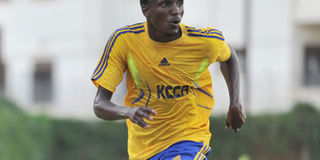Egypt might have saved us more embarrassment

Michael Birungi was one of the few shining lights for KCC against Azam on Sunday. PHOTO BY Ismail Kezaala
At 4-0 down to a country Uganda have lost seven out of eight times the two have met, the Kobs will have to first help Cranes qualify for the Nations Cup before they can overturn the deficit against Egypt on August 1 at Nakivubo.
It is fair to say the Kobs can still qualify for this year’s Caf U-23 Championship if they score at least four to force a penalty shootout.
But even that is a tough ask for the averagely older players turning out for the team meant for footballers born on/or after January 1, 1993. While it is true there are some youngsters fitting that age category in Micho Sredojevic’s side, it is a norm for Fufa to knowingly call up players that have played in the topflight league as early as 2007 (would have been 14-year-olds then), only to be asked if you are their parents when you raise the concern.
Such was not asked of Caf when they reined in some five years ago to ban us for fielding an overage player in the U-17 Championship qualifiers.
Nor was it asked of Egypt, who are known for vibrant youth structures that track their age from infancy.
Egypt did not have to first report to Caf that we used some overage players in the previous games against Rwanda – and, well...against them. They sorted it on the pitch.
Their reward for not using a short-cut to success was evident in the way the team that won the Caf U-20 Championships in Algeria in 2013 rolled past us in Alexandria. The reward for Kobs was those genuinely under 23 continuing to suffer the brunt of cheating.
And once Egypt complete the job in two weeks’ time – unless, of course, Uganda become the first country to walk on water since Jesus, they will have saved us another embarrassment of a ban given that evidence had already been gathered after the two legs against Rwanda.
************************
Changes needed in Cecafa
Watching Azam play KCC rugged in the Cecafa Kagame Cup on Sunday was no surprise.
One team were in full flight, thanks to the chemistry as a result of staying together for some good spell while another, KCC, were trying out the chemistry having seen many players from last season leave and a good number come in.
A little more patience will do for the KCC faithful. Bar Joseph Ochaya on the left midfield and Michael Birungi on the right, there was little to write about a KCC side torn apart by sporadic counter-attacks and some neat interplay. That they went down only by a goal to nil will have surprised even KCC. I, however, still back them to progress from Group C that also includes Ehiopia’s Adama City, who were stunned by Malakia of South Sudan 2-1.
That is not the gist of this write-up, though. Watching this game, a colleague sent me a Whatsapp message asking what criterion Cecafa use for participating teams.
He was wondering why KCC were representing Uganda, and not Vipers, the reigning Ugandan champions.
I explained to him that normally, champions from countries in the Cecafa region in the given year participate in the championship in the following year, with the hosts having at least two or more teams.
Cecafa at times invite guests to make up the numbers. For example, as champions for 2014, KCC are representing Uganda in the 2015 edition. Vipers will, therefore, compete in next year’s edition. Vague? Yes.
Just like the Caf Champions League, Uefa Champions League... name it, last season’s champions will automatically compete in the coming season’s said continental club competitions, not the campaign after. Cecafa can realign their format by allowing both last season’s league champions and the coming season’s national champions to automatically partake in next year’s edition.
Thereafter, only the reigning domestic league holders can automatically play in the Cecafa succeeding the season they were declared national champions.
[email protected], @TheLoveDre on Twitter




